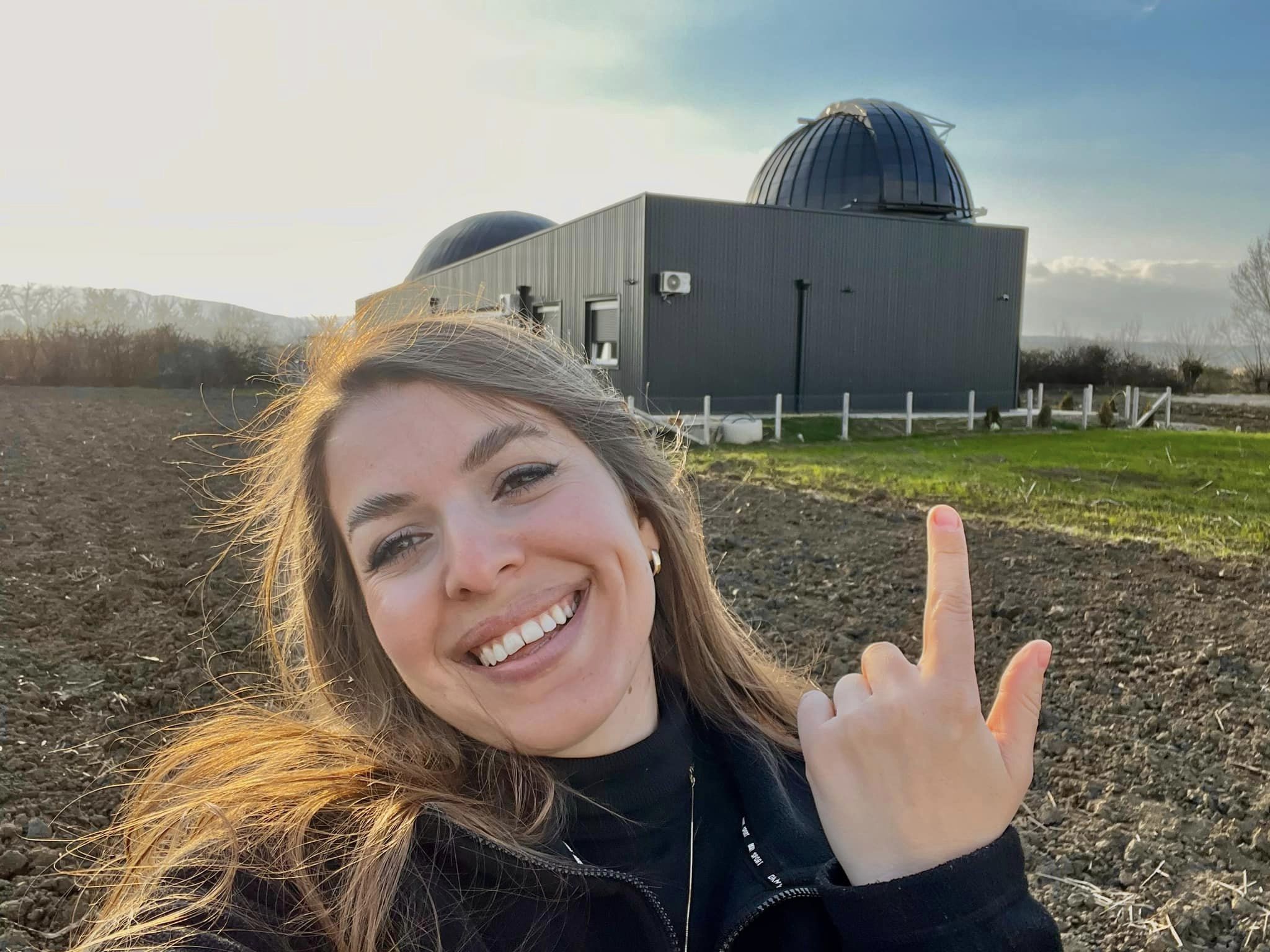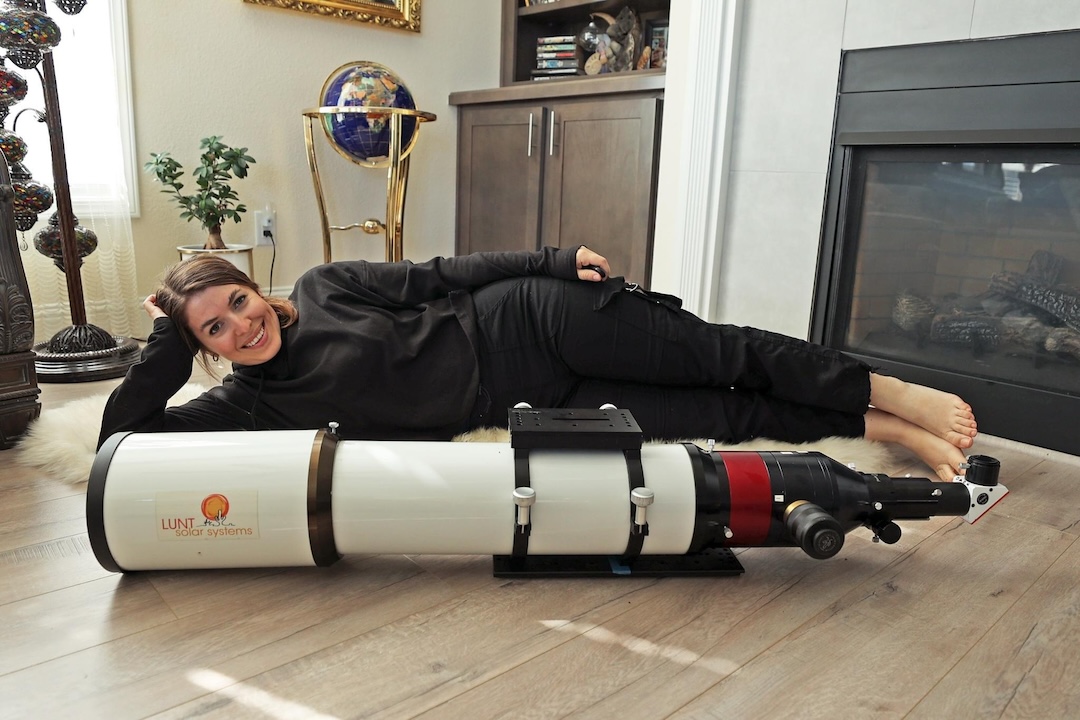Campus News
Ph.D. student leads effort to open Kosovo’s first observatory
Earth’s newest observatory will open to the public on June 20, 2024, coinciding with the summer solstice, thanks in large part to a UC Santa Cruz student from Kosovo who discovered her love of astronomy as a child amidst the chaos of the country’s brutal war for independence over 20 years ago.

Earth’s newest observatory will open to the public on June 20, 2024, coinciding with the summer solstice, thanks in large part to a UC Santa Cruz student from Kosovo who discovered her love of astronomy as a child amidst the chaos of the country’s brutal war for independence over 20 years ago.
A small, landlocked Balkan republic in southeastern Europe, Kosovo would seem an unlikely place for a world-class observatory—except that one of its daughters never gave up on her childhood dream or her desire as an adult to elevate her homeland through education and scientific exploration. Pranvera Hyseni is now a Ph.D. student in earth and planetary sciences at UC Santa Cruz—the only student from Kosovo pursuing this discipline.
In 2015, Hyseni founded Astronomy Outreach of Kosovo, a non-governmental, nonprofit organization dedicated to research, public outreach, and political advocacy for projects related to astronomy, planetary science, and space exploration in Kosovo. AOK has worked with the Ministry of Education, Science and Technology in Kosovo on bringing lecturers to public schools across the country, with the ultimate goal of securing enough resources to build the first observatory and planetarium in Kosovo.
The new facility, in the town of Shtime, consists of a 50-seat planetarium under a 9-meter-wide dome, next to a 6-meter-wide dome that will serve as the observatory, housing a 14-inch-wide telescope donated by Celestron. The largest solar telescope in eastern Europe, also donated, will be installed on the observatory’s terrace because it was too big to fit under the retracting dome.
Aside from the generous donations from leading telescope manufacturers, Kosovo’s National Observatory and Planetarium was realized with about €300,000 in government funding for its construction. Hyseni petitioned parliament for the money while she was an undergraduate in Kosovo, on behalf of the nonprofit she founded. Many individuals and organizations around the world have helped AOK achieve its goal since Hyseni first reached out to them in 2010, when the internet came to Kosovo.
“The National Observatory and Planetarium symbolizes Kosovo’s resilience and determination to rebuild our nation through education and scientific exploration,” Hyseni said. “This momentous occasion will not only mark the culmination of years of hard work and dedication, but also serve as a catalyst for inspiring future generations of scientists and innovators in Kosovo.”
In the near term, the facility will be completely dependent on income generated from visitors, with plans to apply for grants in the future.

The $12,000 Lunt LS152 Hydrogen alpha solar telescope to be installed on the observatory’s terrace was donated by the Atlanta-based nonprofit Charlie Bates Solar Astronomy Project (CBSAP). Founded in 2008, the organization is known as the largest solar astronomy outreach program in the world, and has taught observational solar astronomy and narrowband solar imaging to hundreds of thousands of people in 27 countries.
“We discovered Pranvera and AOK through social media back in 2014 and have been supporting her and AOK ever since,” said CBSAP Founder Stephen Ramsden. “We are extraordinarily proud of her accomplishments and honored to be a part of the observatory grand opening.”
Hyseni completed her undergraduate studies in geography at the University of Pristina, but then left Kosovo because no degree program for astronomy was offered there. The only university she applied to was UC Santa Cruz, where she was first admitted in 2020 and earned her master’s in earth and planetary sciences. She is now a third-year Ph.D. student in the same program and—in alignment with the university’s focus on positive impact and inclusivity—continues to oversee the observatory project she launched nine years ago.
“This underscores UC Santa Cruz’s commitment to global engagement and the empowerment of students as agents of positive change, as well as its dedication to fostering a diverse and inclusive learning environment that encourages students to pursue their passions and make a meaningful impact on the world stage,” Hyseni said. “This story not only highlights the transformative power of education and science, but also exemplifies the values of innovation, perseverance, and community that define the university and reaffirm its position as a leading institution in promoting global citizenship and social responsibility.”
UC Santa Cruz astronomy professors Myriam Telus and Puragra “Raja” Guhathakurta will travel to Kosovo to speak at the June 20 public debut. Telus, Hyseni’s advisor, described the observatory’s inauguration as “an extraordinary achievement” for a student who is already working toward a Ph.D.
“I’m excited about how the observatory will ignite curiosity about the universe and transform lives for generations,” Telus said. “I’m honored to support the inauguration and am looking forward to celebrating this momentous occasion.”